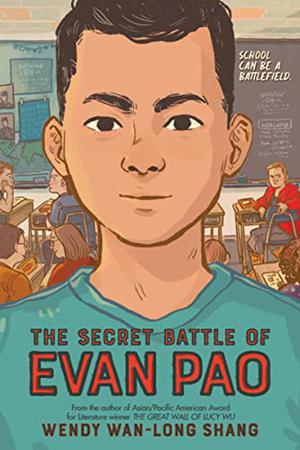In her new book for middle-grade readers, The Secret Battle of Evan Pao, Wendy Wan-Long Shang not only explores how young people often deal with conflict but also wonders about their capacity for reconciliation. Through her main character, sixth grader Evan Pao, Shang shares what it means to be “Mr. Sensitive” in a world that often shows no mercy.
A human lie-detector with bright and curious eyes, Evan has a sense for when people are not telling the truth. However, his ability fails him when it comes to his father’s swindling ways, which ultimately force the family to flee their home in California. Their move takes them to Haddington, Virginia, where the Civil War is still celebrated through Battlefield Day at Battlefield Elementary School.
When all the other students are invited to bring in an heirloom connected to the Civil War, Evan misunderstands and looks for a loom to make cloth. However, his friend Max Baldwin sets him straight on finding an ancestral connection. Wanting to feel a sense of belonging, Evan discovers that Chinese Americans fought as soldiers in the American Civil War. This discovery changes his outlook on history, but others in town aren’t as pleased by this new knowledge. Still, Evan takes inspiration from Edward Day Cohota, who—despite the Chinese Exclusion Act, which prevented him from becoming a U.S. citizen—continued to salute the flag every evening and loved the United States, even when it didn’t seem to love him back. After all, “some stories make you think differently about others, but [the important thing is that a story can also change] something about you” (171).
On his truth-telling journey, Evan realizes that just because we don’t know something doesn’t mean it isn’t real; we may simply need to expand our frame of reference and build on our experiences. Sometimes we even need to rethink and revise our previous thinking—especially when it comes to our assumptions or the conclusions we’ve drawn about people. After all, we often see what we want to see rather than looking with unbiased eyes. He also understands that fake safety is not his favored mode of operation. He’d rather know the truth than be told some falsehood for the sake of “protection.”
Another perk of Shang’s novel is her statement about dogs being less terrible than people. Dogs don’t yell or get mad when we make mistakes. “They just want some food, affection, and a walk now and then” (191).
Finally, Shang reminds us not only that mercy can be just as powerful as intimidation but that one gesture, one word, or even one letter can change a message. She encourages us all to seek out genuine engagement in favor of shouting across the Internet, labelling, or shutting down important parts of our history. She further invites us to “contemplate each other’s humanity, our mutual foibles, and the fact that we must all live together” (258).
- Posted by Donna

